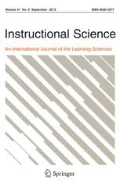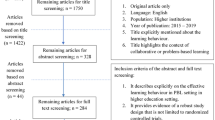Abstract
Medical schools are increasingly looking to case-based formats such as problem-based learning (PBL) for their medical students. However, the effects of PBL have not been adequately assessed for an informed decision. An approach to assessment should consider not just the knowledge outcomes expected of all students, but should be tailored to the theoretical goals of PBL: clinical reasoning, integration of scientific and clinical knowledge, and lifelong learning skills. This means that problem-solving processes as well as products need to be measured. In addition, cognitive measures associated with expert performance can be used to assess the extent to which PBL affects the development of expertise. In this study, students taking an elective in PBL were compared with students taking other electives on a realistic pathophysiological explanation task. The problem-solving protocols were examined for coherence, use of science concepts, strategy use, and self-directed learning. The results indicate that cognitive measures can be used to distinguish students who have participated in PBL from their counterparts in terms of knowledge, reasoning, and learning strategies. This suggests that such measures may play a meaningful role in assessment of student learning.
Similar content being viewed by others
References
Adams, L., Kasserman, J., Yearwood, A., Perfetto, G., Bransford, J., and Franks, J. (1988). The effect of facts versus problem oriented acquisition. Memory & Cognition 16: 167–175.
Albanese, M.A. and Mitchell, S. (1993). Problem-based learning: A review of literature of its outcome and implementation issues. Academic Medicine 68: 52–81.
Barrows, H.S. (1985). How to Design a Problem-Based Curriculum for the Preclinical Years. NY: Springer.
Bassok, M. and Holyoak, K.J. (1993). Pragmatic knowledge and conceptual structure: Determinants of transfer between quantitative domains. In D.K. Detterman and R.J. Sternberg, eds., Transfer on Trial: Intelligence, Cognition, and Instruction (pp. 68–98). Norwood NJ: Ablex.
Bereiter, C. and Scardamalia, M. (1989). Intentional learning as a goal of instruction. In L.B. Resnick, ed., Knowing, Learning, and Instruction: Essays in Honor of Robert Glaser (pp. 361–392). Hillsdale NJ: Erlbaum.
Boshuizen, H.P.A., Schmidt, H.G., and Wassmer, L. (1990). Curriculum style and the integration of biomedical and clinical knowledge. Paper presented at the Second International Symposium on Problem-based Learning. Yogyakarta, Indonesia.
Bransford, J.D., Franks, J.J., Vye, N.J., and Sherwood, R.D. (1989). New approaches to instruction: Because wisdom can't be told. In S. Vosniadou and A. Ortony, eds., Similarity and Analogical Reasoning (pp. 470–497). New York: Cambridge University Press.
Brooks, L.R., Norman, G.R., and Allen, S.W. (1991). Role of specific similarity in a medical diagnostic task. Journal of Experimental Psychology: General 120: 278–287.
Chi, M.T.H., Bassok, M., Lewis, M.W., Reimann, P. and Glaser, R. (1989). Self-explanations: How students study and use examples in learning to solve problems. Cognitive Science 13: 145–182.
Dolmans, D. (1994). How Students Learn in a Problem-Based Curriculum. Doctoral dissertation, University of Limburg, Maastricht, The Netherlands: University Pers Maastricht.
Elstein, A.S. (1994). What goes around comes around: Return of the hypothetico-deductive strategy. Teaching and Learning in Medicine 6: 121–123.
Glaser, R. and Silver, E. (1994). Assessment, testing, and instruction: Retrospect and prospect. In L. Darling-Hammond, ed., Review of Research in Education Vol. 20 (pp. 393–419). Washington DC: American Educational Research Association.
Goldman, S.R., Pellegrino, J.W., and Bransford, J. (1994). Assessing programs that invite thinking. In E.L. Baker and H.F., O'Neill, eds., Technology Assessment in Education and Training (pp. 199–230). Hillsdale, NJ.: Erlbaum.
Hmelo, C.E. (1993). Learning in School and Learning in Life: An Exploration of Issues (Tech. Rep. No. 93–1). Nashville TN: Vanderbilt University Learning Technology Center.
Kolodner, J.L. (1993). Case-Based Reasoning. San Mateo CA: Morgan Kaufmann.
Lesgold, A., Rubinson, H, Feltovich, P., Glaser R., Klopfer, D., and Wang, Y. (1988). Expertise in a complex skill: Diagnosing x-ray pictures. In M.T.H. Chi, R. Glaser, and M.J. Farr, eds., The Nature of Expertise (pp. 311–342). Hillsdale NJ: Erlbaum.
Needham, D.R. and Begg, I.M. (1991). Problem-oriented training promotes spontaneous analogical transfer: Memory-oriented training promotes memory for training. Memory and Cognition 19: 543–557.
Ng, E. and Bereiter, C. (1991). Three levels of goal orientation in learning. Journal of the Learning Sciences 1: 243–271.
Norman, G.R. and Schmidt, H.G. (1992). The psychological basis of problem-based learning: A review of the evidence. Academic Medicine 67: 557–565.
Norman, G.R., Trott, A.D., Brooks, L.R., and Smith, E.K. (1994). Cognitive differences in clinical reasoning related to postgraduate training. Teaching and Learning in Medicine 6: 114–120.
Patel, V.L., Groen, G.J. and Arocha, J.F. (1990). Medical expertise as a function of task difficulty. Memory & Cognition 18: 394–406.
Patel, V.L., Groen, G.J. and Norman, G.R. (1993). Reasoning and instruction in medical curricula. Cognition & Instruction 10: 335–378.
Patel, V. L. and Kaufman, D.R. (1993). Development of Knowledge-Based Reasoning Strategies with Medical Training (Technical Report No. CME93-CS3). Cognitive Studies in Medicine: Centre for Medical Education.
Schmidt, H.G. and Boshuizen, H.P.A. (1993). On acquiring expertise inmedicine. Educational Psychology Review 5: 205–221.
Schmidt, H.G., DeVolder, M.L., De Grave, W.S., Moust, J.H.C., and Patel, V.L. (1989). Explanatory models in the processing of science text: The role of prior knowledge activation through small-group discussion. Journal of Educational Psychology 81: 610–619.
Williams, S.M. (1993). Putting case based learning into context: Examples from legal, business, and medical education. Journal of the Learning Sciences 2: 367–427.
Author information
Authors and Affiliations
Corresponding author
Rights and permissions
About this article
Cite this article
Hmelo, C.E., Gotterer, G.S. & Bransford, J.D. A theory-driven approach to assessing the cognitive effects of PBL. Instructional Science 25, 387–408 (1997). https://doi.org/10.1023/A:1003013126262
Issue Date:
DOI: https://doi.org/10.1023/A:1003013126262




